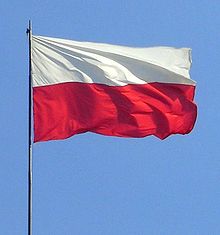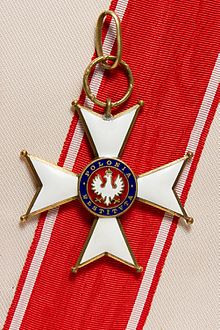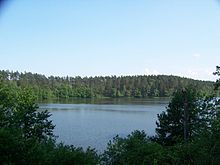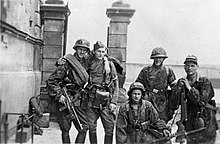Poland
Appearance

Poland is not yet lost. ~ Józef Wybicki
Poland, officially the Republic of Poland (Polish: Rzeczpospolita Polska), is a country in the eastern European Union. It is bordered by Lithuania to the northeast, Belarus and Ukraine to the east, Slovakia and the Czech Republic to the south, Germany to the west, and the Baltic Sea and Kaliningrad Oblast (a Russian exclave) to the north. Its capital and largest city is Warsaw.









A
[edit]- Finis [regni] Poloniæ.
- The end [of the kingdom] of Poland!
- Words placed in the mouth of Kosciusko, after the defeat of Maciejowice, 10 October 1794, and formally repudiated by Kosciusko himself to Ségur in a letter of 12 November 1803.
- Count L. P. de Ségur, Histoire de Frédéric-Guillaume II (Paris, 1800); Süd-Preussischen Zeitung (25 October 1794); V. Amédée Renée’s tr. of Cesare Cantu’s Storia di cento anni—Histoire de cent ans (Paris, 1852), vol. 1, p. 419n; W. F. H. King, Classical and Foreign Quotations, 3rd ed. (1904), no. 804
B
[edit]- Poland has experienced a tremendous amount of history due to the fact that it has no natural defensible borders, which makes it very easy to conquer. Many times the other nations didn't even mean to invade Poland; one night they'd simply forget to set the parking brakes on their tanks, and they'd wake up the next morning and discover that, whoosh, they had conquered Poland. But thanks to advances in international law such as the speed bump, Poland is now a totally independent nation, and it has managed to greatly improve its lifestyle thanks to the introduction of modern Western conveniences such as food. Today Poland proudly boasts the nickname "The North Dakota of Europe," and is well worth a visit if you happen to be in the neighborhood for some reason, such as your plane has crashed.
- Dave Barry, Dave Barry's Only Travel Guide You'll Ever Need (New York: Fawcett Columbine, 1991), p. 148
- What to See in Poland: They have some really sharp tractors.
- Dave Barry, Dave Barry's Only Travel Guide You'll Ever Need (New York: Fawcett Columbine, 1991), p. 149
- Poland is like an island on the north European plain. At times the island has been swamped by a tide of iron or steel helmets converging from Germany and Russia. At times it has drifted suddenly with the current; if the continent of Africa had drifted relatively as much as the boundaries of Poland have drifted in the last two hundred years, then Africa would at one time have touched the north pole and at another the south pole.
- Geoffrey Blainey, Across a Red World (1968)
- With respect to us, Poland might be, in fact, considered as a country in the moon.
- Edmund Burke, in a parliamentary debate about Britain's war against France. Quoted in Cobbett, William; John Wright, Thomas Curson Hansard (1817). The parliamentary history of England, from the earliest period to the year 1803. T.C. Hansard for Longman, Hurst, Rees, Orme & Brown.
C
[edit]- I judged the Poles by their enemies. And I found it was an almost unfailing truth that their enemies were the enemies of magnanimity and manhood. If a man loved slavery, if he loved usury, if he loved terrorism and all the trampled mire of materialistic politics, I have always found that he added to these affections the passion of a hatred of Poland. She could be judged in the light of that hatred; and the judgment has proved to be right.
- G. K. Chesterton, Introduction to Charles Sarolea’s Letters on Polish Affairs (1922), p. 8
- The soul of Poland is indestructible... she will rise again as a rock, which may for a spell be submerged by a tidal wave, but which remains a rock.
- Winston Churchill, in the House of Commons, 1 October 1939. Quoted in Churchill, Winston Spencer (2005). Maxims and Reflections. Kessinger Publishing.
- There are few virtues which the Poles do not possess and there are few errors they have ever avoided.
- Winston Churchill, in the House of Commons, after the Potsdam Conference. Quoted in Churchill, Winston Spencer (2005). Maxims and Reflections. Kessinger Publishing.
D
[edit]- The Poles... belong to a community which has acquired its modern sense of nationality in active opposition to the policies of the states in which they lived.
- Norman Davies, God's Playground: A History of Poland, Vol. 2 (1981)
- Who only knows Latin can go across the whole Poland from one side to the other one just like he was at his own home, just like he was born there. So great happiness! I wish a traveler in England could travel without knowing any other language than Latin!
- Daniel Defoe (1728), quoted in Norman Davies, God's Playground (2000)
E
[edit]F
[edit]- L’exemple d’un monarque impose et se fait suivre:
Lorsqu’ Auguste buvait, la Pologne était ivre.- A monarch’s example is bound to be followed:
When Augustus drank, Poland in drink simply wallowed. - Frederick II of Prussia, in his Épitre à mon frère (Œuvres, Berlin, 1789, 8°, vol. iv. p. 53), as translated by W. F. H. King, Classical and Foreign Quotations, 3rd ed. (1904), no. 345
- A monarch’s example is bound to be followed:
- After two years of traveling almost exclusively to Western Europe and the Middle East, Poland feels like a geopolitical spa. I visited here for just three days and got two years of anti-American bruises massaged out of me. Get this: people here actually tell you they like America – without whispering. What has gotten into these people? Have all their subscriptions to Le Monde Diplomatique expired? Haven't they gotten the word from Berlin and Paris? No, they haven't. In fact, Poland is the antidote to European anti-Americanism. Poland is to France what Advil is to a pain in the neck. Or as Michael Mandelbaum, the Johns Hopkins foreign affairs specialist, remarked after visiting Poland: "Poland is the most pro-American country in the world – including the United States."
- Thomas L. Friedman, "Where U.S. Translates As Freedom", The New York Times (28 December 2003)
G
[edit]- The Polish soldier is a marcher of extraordinary endurance.
- Charles de Gaulle, as quoted in Warsaw 1920: Lenin's Failed Conquest of Europe (2008), William Collins, p. 105.
H
[edit]- Ich habe den Befehl gegeben – und ich lasse jeden füsilieren, der auch nur ein Wort der Kritik äußert – daß das Kriegsziel nicht im Erreichen von bestimmten Linien, sondern in der physischen Vernichtung des Gegners besteht. So habe ich, einstweilen nur im Osten, meine Totenkopfverbände bereitgestellt mit dem Befehl, unbarmherzig und mitleidslos Mann, Weib und Kind polnischer Abstammung und Sprache in den Tod zu schicken.
- I have issued the command – and I'll have anybody who utters but one word of criticism executed by a firing squad – that our war aim does not consist in reaching certain lines, but in the physical destruction of the enemy. Accordingly, I have placed my death-head formation in readiness – for the present only in the East – with orders to them to send to death mercilessly and without compassion, men, women, and children of Polish derivation and language.
- Adolf Hitler, Obersalzberg Speech (22 August 1939), par. 3, as translated by Louis Paul Lochner, What About Germany (1942), pp. 11–12
- Warsaw can no more be Tartar than Venice can be Teuton. Kings lose their pains and their honor in the attempt to make them so. Sooner or later, the submerged part floats to the surface and reappears. Greece becomes Greece again, Italy is once more Italy. The protest of right against the deed persists forever. The theft of a nation cannot be allowed by prescription. These lofty deeds of rascality have no future. A nation cannot have its mark extracted like a pocket handkerchief.
- Victor Hugo, Les Misérables (1862), as translated by Isabel F. Hapgood (New York: Thomas Y. Crowell & Co., 1887), Bk. IV, Ch. 1
I
[edit]J
[edit]- Quant à l'action qui va commencer, elle se passe en Pologne, c’est-à-dire nulle part.
- As to the action which is about to begin, it takes place in Poland – that is to say, nowhere.
- Introduction to the premier of Ubu Roi in Paris in 1896. Quoted in Jarry, Alfred; transl. Beverly Keith and Gershon Legman (2003). Ubu Roi. Dover Publications.
K
[edit]- But we cannot be blamed for not taking seriously people who, unable though they are to remember correctly any single fact from our history or to say which barbaric dialect we speak, are perfectly able instead to teach us how liberated we are in the East.
- Leszek Kołakowski, "My Correct Views on Everything" (1974), as quoted in Is God Happy? Selected Essays (2013), Basic Books, p. 128.
- Poles cherish a heroic image of themselves, unshared by and little known in the outside world. One of their self-glorifying images is that of the defiant Pole. According to the Polish version of history, the Czechs allowed German occupation and the Poles resisted. The Czechs accepted communism in 1948 and the Poles resisted. The Poles rebelled in 1956 and supported the uprising in Budapest, while the Czechs said nothing and remained loyal to Moscow. Poles recall the fact that they sent a food shipment to support the Hungarian rebels, but the trucks had to pass through Czechoslovakia, where they were stopped. In the complicated pecking order of central Europe’s national images, Poles say that in 1956 “the Hungarians acted like Poles, the Poles like Czechs, and the Czechs acted like pigs.” Now the Czechs, whom the Poles had sneered at under Novotny’s Stalinist anachronism, were becoming the vanguard communist nation, the one to be followed. “It was surprising to see the Czechs ahead of us. They were supposed to be the opportunists and cowards,” said Eugeniusz Smolar.
- Mark Kurlansky, 1968: The Year that Rocked the World (2004), pp. 125-126, ISBN 0-345-45581-9
L
[edit]- Forbid it, England—by thine own great self,
By thine own yet unviolated hearths,
. . . .
Let not thy minister go forth in vain:
The fate of Poland now is at thy will;
The Autocrat will hear and heed thy voice;
England, my glorious country, speak, and save!- Letitia Elizabeth Landon, Fisher's Drawing Room Scrap Book, 1833 (1832), "The Right Honourable Lord Durham – Now on an Embassy at the Court of Russia"
M
[edit]- And Poland at last proclaimed: "Whoever he be that comes to me, he shall be free and equal, because I am freedom."
- Adam Mickiewicz, , as translated by Krystyn Lach-Szyrma, The Books and the Pilgrimage of the Polish Nation (1833), p. 18
N
[edit]O
[edit]- Cultivation, old civilization, beauty, history! Surprising turnings of streets, shapes of venerable cottages, lovely aged eaves, unexpected and gossamer turrets, steeples, the gloss, the antiquity! Gardens. Whoever speaks of Paris has never seen Warsaw. [...] Whoever yearns for an aristocratic sensibility, let him switch on the great light of Warsaw.
- Cynthia Ozick, The Shawl (1989), the character Rosa Lublin, from Rosa (p. 21), {{cite book
P
[edit]- Żeby Polska była Polską.
- Let Poland be Poland.
- Jan Pietrzak, Polish comedian. Title of a patriotic song written in 1976 which became an informal anthem of the Solidarity movement in the 1980s.
- Polish National Hymns, Anthems, and Patriotic Songs. The Polish Academic Information Center. Retrieved on 2009-09-05.
- A great nation, only the people are cunts.
- Józef Piłsudski, as quoted in Myśli i wypsknięcia (Warszawa 2010), p. 41
- We shall soon have the scenes of the Polish Diets and elections re-acted here, and in not many years the fate of Poland may be that of United America.
- Charles Pinckney, speech to the U.S. Congress in 1800 about presidential elections. Quoted in Vile, John R. (2005). The Constitutional Convention of 1787: A Comprehensive Encyclopedia of America's Founding. ABC-CLIO.
Q
[edit]R
[edit]- Well, from here I will go to Bonn and then Berlin, where there stands a grim symbol of power untamed. The Berlin Wall, that dreadful gray gash across the city, is in its third decade. It is the fitting signature of the regime that built it. And a few hundred kilometers behind the Berlin Wall, there is another symbol. In the center of Warsaw, there is a sign that notes the distances to two capitals. In one direction it points toward Moscow. In the other it points toward Brussels, headquarters of Western Europe's tangible unity. The marker says that the distances from Warsaw to Moscow and Warsaw to Brussels are equal. The sign makes this point: Poland is not East or West. Poland is at the center of European civilization. It has contributed mightily to that civilization. It is doing so today by being magnificently unreconciled to oppression. Poland's struggle to be Poland and to secure the basic rights we often take for granted demonstrates why we dare not take those rights for granted. Gladstone, defending the Reform Bill of 1866, declared, ``You cannot fight against the future. Time is on our side.'' It was easier to believe in the march of democracy in Gladstone's day -- in that high noon of Victorian optimism.
- Poland has been a source of trouble for over five hundred years.
- Franklin D. Roosevelt, in a conversation with Winston Churchill in Yalta in 1945. Reported in Churchill, Winston (1986). The Second World War, Volume 6: Triumph and Tragedy. Mariner Books.
S
[edit]- It has been said that Poland is dead, exhausted, enslaved, but here is the proof of her life and triumph
- This homage has been rendered not to me – for the Polish soil is fertile and does not lack better writers than me – but to the Polish achievement, the Polish genius.
T
[edit]- For two centuries, Poland suffered constant and brutal attacks. But while Poland could be invaded and occupied, and its borders even erased from the map, it could never be erased from history or from your hearts. In those dark days, you have lost your land, but you never lost your pride. So it is with true admiration that I can say today, that from the farms and villages of your countryside to the cathedrals and squares of your great cities, Poland lives, Poland prospers, and Poland prevails. ** Donald Trump, Remarks in Warsaw, Poland; 6 July 2017
- Nobody who comes to Poland will be in any danger because of his race. This is not our custom, as is not pointing out similar incidents in other countries, although we know they take place. In Poland, they're a rarity.
- Donald Tusk, as quoted in "Euro 2012: Poland and Ukraine hit back at racism accusations" (29 May 2012), The Guardian.
- Через труп белой Польши лежит путь к мировому пожару.
- (Cherez trup beloy Pol'shi lezhit put' k mirovomu pozharu.)
- Over the corpse of White Poland lies the road to world-wide conflagration.
- Mikhail Tukhachevsky, order of Russian invasion of Poland in 1920. Quoted in Davies, Norman (1996). Europe: A History. Oxford University Press.
U
[edit]V
[edit]- Un polonais – c'est un charmeur; deux polonais – une bagarre; trois polonais, eh bien, c'est la question polonaise.
- One Pole is a charmer; two Poles – a brawl; three Poles – well, this is the Polish Question.
- Voltaire, quoted in Davies, Norman (1996). Europe: A History. Oxford University Press.
W
[edit]- An independent Polish state should be erected which should include the territories inhabited by indisputably Polish populations, which should be assured a free and secure access to the sea, and whose political and economic independence and territorial integrity should be guaranteed by international covenant.
- Woodrow Wilson, Fourteen Points (1918)
- Jeszcze Polska nie zginęła...
- Poland is not yet lost...
- Incipit of the national anthem of Poland, written by Józef Wybicki in 1797
- Ustawa z dnia 31 stycznia 1980 r. o godle, barwach i hymnie Rzeczypospolitej Polskiej oraz o pieczęciach państwowych – Dziennik Ustaw z 2005 r. Nr 235, poz. 2000
- Poland has not yet perished,
So long as we still live.
What the foreign force has taken from us,
We shall with sabre retrieve.- "Dąbrowski's Mazurka", First stanza, current official version, original author Józef Wybicki
- Ustawa z dnia 31 stycznia 1980 r. o godle, barwach i hymnie Rzeczypospolitej Polskiej oraz o pieczęciach państwowych – Dziennik Ustaw z 2005 r. Nr 235, poz. 2000
- March, march, Dąbrowski,
From Italy to Poland.
Under your command
We shall rejoin the nation.- "Dąbrowski's Mazurka", chorus, current official version, original author Józef Wybicki
- Ustawa z dnia 31 stycznia 1980 r. o godle, barwach i hymnie Rzeczypospolitej Polskiej oraz o pieczęciach państwowych – Dziennik Ustaw z 2005 r. Nr 235, poz. 2000
- We'll cross the Vistula, we'll cross the Warta,
We shall be Polish.
Bonaparte has given us the example
Of how we should prevail.- "Dąbrowski's Mazurka", third stanza, current official version, original author Józef Wybicki
- Ustawa z dnia 31 stycznia 1980 r. o godle, barwach i hymnie Rzeczypospolitej Polskiej oraz o pieczęciach państwowych – Dziennik Ustaw z 2005 r. Nr 235, poz. 2000
- Like Czarniecki to Poznań
After the Swedish annexation,
To save our homeland,
We shall return across the sea.- "Dąbrowski's Mazurka", third stanza, current official version, original author Józef Wybicki
- Ustawa z dnia 31 stycznia 1980 r. o godle, barwach i hymnie Rzeczypospolitej Polskiej oraz o pieczęciach państwowych – Dziennik Ustaw z 2005 r. Nr 235, poz. 2000
See also
[edit]External links
[edit] Encyclopedic article on Poland on Wikipedia
Encyclopedic article on Poland on Wikipedia Media related to Category:Poland on Wikimedia Commons
Media related to Category:Poland on Wikimedia Commons The dictionary definition of Poland on Wiktionary
The dictionary definition of Poland on Wiktionary Poland travel guide from Wikivoyage
Poland travel guide from Wikivoyage
